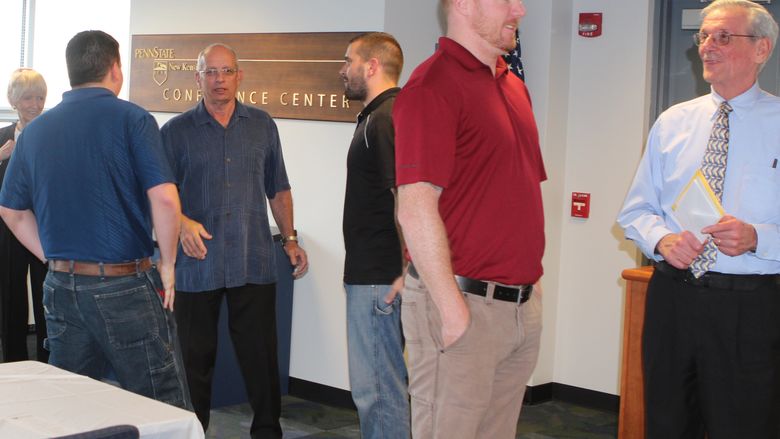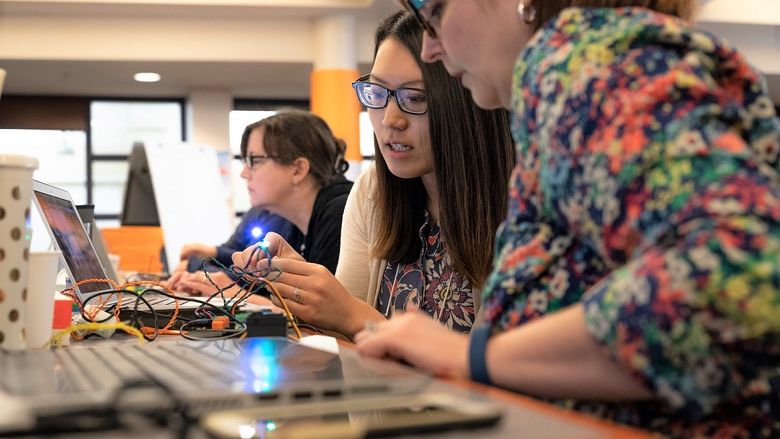
The “Finch Robots” workshop, presented by Andy DeAntonio, standing, a teacher in the New Kensington-Arnold School District, featured tips on implementing robots into the curriculum. The workshop was a part of STREAM Showcase 2016 at Penn State New Kensington.
UPPER BURRELL, Pa. — Educators, business representatives, government officials and network partners gathered at Penn State New Kensington in February for the third phase of the Alle-Kiski Best Practices Collaborative CREATE Lab Satellite Network Regional Hub, better known by its acronym, ABC CREATE.
The series of workshops, “STREAM Showcase 2016,” provided participants with updates on the STEM (science, technology, engineering and math) education within individual districts. Adding reading and arts components to STEM creates STREAM. The ABC CREATE advisory board reported on the program's future plans.
Spearheaded by New Kensington Chancellor Kevin Snider, ABC CREATE is a campus partnership with 15 local school districts, the CREATE Lab at Carnegie Mellon University, Westmoreland County Community College and Penn State Electro-Optics Center. The program includes the school districts of Allegheny Valley, Apollo-Ridge, Armstrong, Burrell, Deer Lakes, Freeport, Fox Chapel, Franklin Regional, Highlands, Kiski Area, Leechburg, New Kensington-Arnold, Plum, Riverview and South Butler. The collaboration will benefit approximately 40,000 students from kindergarten to grade 12 in the Alle-Kiski Valley.
The campus was awarded a $300,000 grant from the Grable Foundation to work in concert with the school districts, government and industry to share best practices and to integrate technology into classrooms to prepare students for future careers. The program expands innovative teaching and learning through the STREAM initiative.
More than 150 participants, including teachers and administrators, took part in the workshops that focused on three key strategies — learning new technologies to engage high school students in STEM fields; collaborating with colleagues to share ideas and strengthen the region; and using technology to integrate education and business.
The keynote speaker was Randy Sargent, senior systems scientist for the CREATE Lab at Carnegie Mellon. Sargent’s presentation featured the lab's newest technology, Earth TimeLapse, which shows the human impact on the Earth over the past 30 years. For example, glacier movements since 1985 can be condensed into a few minutes using time-lapse technology.
Sargent demonstrated the potency of data when it is paired with visualization, a powerful tool for social justice. Sargent, who serves as a visiting scientist for the Google Earth Engine team, also explored data visualization for other complex systems, including air and water quality, climate change, personal health, employment and economic trends. Google Earth Engine is a cloud-computing platform for processing satellite imagery and other Earth observation data. It provides access to a warehouse of satellite imagery and the computational power needed to analyze those images. The platform was developed by Google, in partnership with Carnegie Mellon, and NASA.
A Massachusetts Institute of Technology graduate, Sargent earned rave reviews from participants in their post-conference evaluations. One teacher said, “I couldn't stop thinking about ways to integrate the data into my lessons.” Another teacher noted that there were “a lot of opportunities for cross-curricular work between science and social studies.”
The keynote speech was followed by morning and afternoon breakout sessions, many of which were hosted by the school districts. The New Kensington-Arnold’s “Finch Robots” session featured tips on implementing robots into the curriculum. The presentation, “Veteran’s Memorial Project," explained how Kiski Area created a database of veteran memorials within the district. The accompanying website will include various elements that will evolve through the years. The “Hear Me Project,” organized by Carnegie Mellon, looked into gender bias in STEM classes.
“The showcase provided a better understanding of how STREAM intersects grade levels and subjects,” said Colleen Smith, STEM outreach coordinator for the campus and facilitator of the new initiative. “Districts learned from other districts about how to think creatively in implementing STREAM.”
The next phase of ABC CREATE will focus on teacher training for creative technology projects. The summer sessions will be conducted by teacher advocates who have already brought the process to their classroom. In addition, the advisory board will continue to work on implementing cross-district projects developing technological fluency across grade levels.
For more information, contact Smith at 724-334-6138 or [email protected].
The Collaborative
ABC CREATE works to identify strengths, resources and needs related to STEM education within individual districts and to share best practices and integrate technology into classrooms to prepare students for future careers. The program helps develop teacher advocates and build an educationally focused collaborative.
“Our reputation as a regional leader resulted in our taking leadership in helping to address the STEM needs of school districts,” Snider said. “We currently are leading an effort to develop a regional approach to STEM education across six and ultimately 15 school districts in the Alle-Kiski Valley that shares the best STEM teachers in each grade within the region.”
The first phase of the program began in 2014 with an inaugural meeting of the program’s advisory board. Comprising superintendents from the charter member school districts and representatives from the founding organizations, the board was tasked with guiding the implementation and development of the project. A conference last year brought together teachers from all 15 school districts to learn about ways of using technology in a variety of classes.
“By pulling resources, ideas and partners together with an explicit purpose, they could significantly energize and strengthen the educational growth within this geographically concentrated area,” Smith said.
The pilot program is an opportunity to impact students and teachers in this region and to develop a project that other regions will be able to replicate to help strengthen communities across the country.
Bill Woodard
Alumni and Public Relations Specialist

